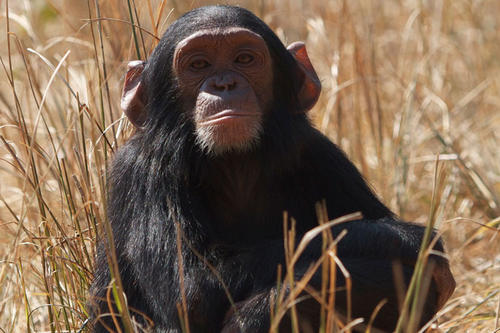Studying Chimpanzees in Zambia
At a refuge for great apes in Africa, plans call for students to engage in field research – donors are being sought
Jan 08, 2013
About 140 monkeys live in the Chimfunshi sanctuary in Zambia. Young Max is one of them.
Image Credit: K. Liebal / D. Haun
Chimpanzees playing with each other, grooming each other’s hair, or fighting for their spot in the social pecking order – at Chimfunshi, a wildlife sanctuary in Zambia, scientists and scholars can observe the great apes up close. In the near future, plans also call for giving students of psychology from Freie Universität Berlin a chance to amass initial experience in field research in southern Africa even before they complete their study programs. “Chimfunshi offers the unique opportunity to observe the complex social behavior of chimpanzees in almost their natural environment,” explains Katja Liebal, a junior professor of evolutionary psychology at Freie Universität. Liebal is performing a study of multimodal expression of emotion there, studying the gestures and facial expressions chimpanzees use to communicate with each other.
The huge compounds, which are home to about 140 animals, are an ideal place for researchers to study the animals. Liebal and her colleagues observe the apes from platforms, since direct contact with the chimpanzees is prohibited. “Chimpanzees are not cute, cuddly animals,” Liebal says. “Their physical abilities are far superior to those of humans.” The compound represents their territory, she says, and people should respect it as such. The apes come from various regions in Africa, since there are no chimpanzees in Zambia itself. Most of them have come to the “orphanage” after their mothers were killed by poachers and they were kept as pets. The researchers’ work here also draws attention to the efforts made by Chimfunshi – wildlife protection and research fit together perfectly here.
Field Studies
The idea of having students perform a small observational study even before they graduate, thereby also having the opportunity to get to know an African country and the everyday lives of people there, was proposed by Liebal’s colleague Mark Bodamer, a professor of comparative psychology at Gonzaga University, in Spokane, Washington (U.S.). He has been traveling to Chimfunshi with a group of students for more than ten years. During this “field study,” students of psychology and biology can observe chimpanzee behavior, take part in field trips for insight into Zambia’s unique fauna and flora, or teach at the local school. During the program, they live in a camp, cook together, and gather around the campfire at the end of each day – together with local residents and the scientists who work at the refuge.
Chimfunshi, founded 30 years ago by David and Sheila Siddle, now serves an important function as a social and educational project in addition to its role as a wildlife sanctuary and research center. Chimfunshi is funded by a number of sources, especially donations from the German nonprofit association Chimfunshi – Verein zum Schutz bedrohter Umwelt (Association for the Protection of a Threatened Environment). In Zambia, more than 60 percent of the population lives below the poverty line. In this situation, Chimfunshi has emerged as a major local employer: About 70 families, 250 people in all, live and work here – including animal keepers, technical staff, and service workers. Donations have even made it possible to open a school for employees’ children.
In cooperation with Bodamer and Daniel Haun, of the Max Planck Institute for Evolutionary Anthropology, in Leipzig, Liebal now hopes to offer this type of program for students from Freie Universität as well. The only drawback is the hefty price tag – about 2,500 euros per person, counting travel, accommodations, and everything they need in Zambia. Since very few students can afford the expense, Liebal is currently looking for possible sources of financing and donors to support the project.
Further Information
Prof. Dr. Katja Liebal, Department of Education and Psychology, Freie Universität Berlin, Evolutionary Psychology Group, Email: katja.liebal@fu-berlin.de, Tel.: +49 30 838-57846

